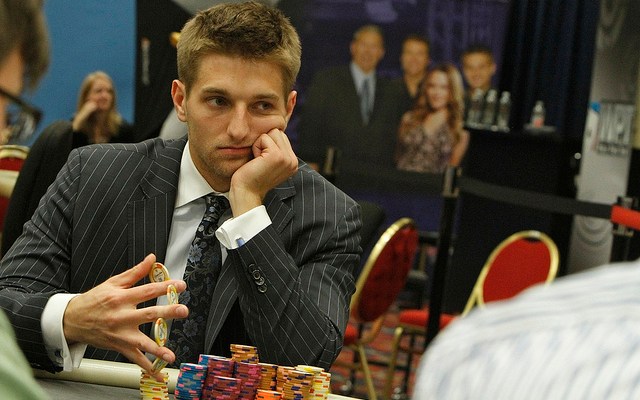About a decade ago, golf courses were considered among the best places to conduct business and make contacts. While visits to country clubs still rank very highly, behind it’s poker. In only a few short years poker has become a major recreational activity for business executives. The game is ideal for networking for many reasons; weather is never a factor and anyone can compete against anyone irrespective of age, gender or athletic ability.
Regardless of your reason for playing poker – for fun, to network or to make money (or even all three) – there are several aspects of the game to consider.
In poker, your actions and style beyond how you play a hand can contribute to your success in achieving your goals.
Friendly Poker Games
Most people don’t understand what the term “friendly play” means.
I recently played the low stakes tables at the Mirage in Las Vegas. This is a game I play a lot for several reasons; I enjoy poker clearly and over the years I have made some good business contacts. The players are typically chatty and friendly. Two new players join the game, one is a securities dealer, the second is a CPA.
The game instantly takes a new turn.
The CPA instantly began a non-stop barrage of talks. He gives “lessons” on how to play a hand, he talks about the cards on the board, he gives players advice on how to play a hand while it is still a work in progress.
All of this stuff are violations of basic standards poker etiquette; the equivalent of talking while a golfer is making his stroke. Others just break the rules.
When he was called out for his actions, his defense was that it was a “friendly” game. Here’s an example of not understanding the term “friendly.” Regardless of the stakes, poker is generally played for real money. The only way to avoid the game getting ugly is to follow the rules. This is particularly true in “friendly” games. In a friendly game, it is fine to gently trick the other players and have fun in general. A “friendly” game also means the rules are followed.
My assumption is that CPAs act the same in home games as they do in casinos.
If you want to use poker as a way to network or grow your business, you must act like a pro. Friendly play means rules and etiquette are followed. Not doing so means you aren’t invited back.
If you are playing as a form of recreation, other people at the table may be doing the same. Demonstrating that you know the rules, written and unwritten, is the best way to make sure you’ll at all times have a seat waiting.
Surprisingly, this also has an effect on your bankroll. If your main goal in playing is to make money, following the rules, smiling and fascinating in friendly conversation is crucial. For some reason, poker players don’t have any problem giving their chips to someone nice, whereas they will every now and then go to great lengths to beat a player who rubs them the wrong way.
Concept in Action
The biggest poker tournament money winner of all time is Daniel Negreanu, which has earnings of over $30 million. Apart from being a really skilled player, he’s probably the most popular players with fans and opponents alike, which has more to do with his personality than his skills. His sense of fairness and sportsmanship is unmatched. He is charming and friendly. He congratulates his opponents when they play well and the only player he’s likely to criticize is himself. He wins or loses by equal grace. In live tournaments, amateur players are happy when he sits down at their table. When he played online, the waiting list to join the game was huge.
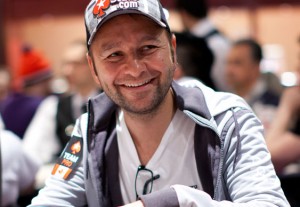 His personality in addition to his skills have contributed to his success away from the poker tables. He had cameos in several films, roles in Katy Perry videos, wrote several best-selling poker books, and was a sought-after television guest. Overall, it is safe to say that Negreanu’s reputation as a class artist has helped him become the most successful poker celebrity of all time.
His personality in addition to his skills have contributed to his success away from the poker tables. He had cameos in several films, roles in Katy Perry videos, wrote several best-selling poker books, and was a sought-after television guest. Overall, it is safe to say that Negreanu’s reputation as a class artist has helped him become the most successful poker celebrity of all time.
Dress Like a Winner
There’s a scene on Fraudster which teaches a crucial lesson for each gambler. Minnesota Fats and Fast Eddie took a break in the middle of their marathon game. Fats changed his clothes and freshened up while Fast Eddie drank. When the game resumes, Fats looks and feels like a winner, and Kid looks like a loser. Unsurprisingly, Fats won.
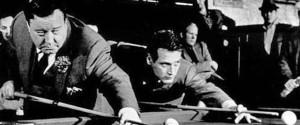 This axiom is well known in the business world and is summed up in a number of clichéd, but accurate, phrases; dress to impress, dress like a winner, look good to feel good. This is one area where poker players often come up short. Checking the tables at any poker room would lead you to believe that to be a poker player you must wear a “uniform” of oversized sunglasses, a hoodie, a baseball cap and a pair of Beats headphones.
This axiom is well known in the business world and is summed up in a number of clichéd, but accurate, phrases; dress to impress, dress like a winner, look good to feel good. This is one area where poker players often come up short. Checking the tables at any poker room would lead you to believe that to be a poker player you must wear a “uniform” of oversized sunglasses, a hoodie, a baseball cap and a pair of Beats headphones.
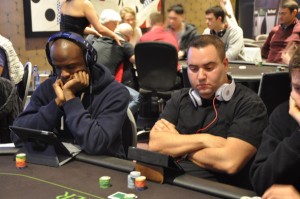 Although there isn’t any need to wear a suit at the poker table (even though players like Tony Dunst and Anthony Zinno did at the final table), a sense of style and luxury can go a long way. Negreanu said he was dressed to be ready for his championship photo. Johnny Chan prefers Versace shirts that are snug and colourful. JJ Liu, one of the pioneering women in poker, at all times wore colourful and festive outfits. Former commodities dealer Eric Seidel’s clothing is primarily business casual.
Although there isn’t any need to wear a suit at the poker table (even though players like Tony Dunst and Anthony Zinno did at the final table), a sense of style and luxury can go a long way. Negreanu said he was dressed to be ready for his championship photo. Johnny Chan prefers Versace shirts that are snug and colourful. JJ Liu, one of the pioneering women in poker, at all times wore colourful and festive outfits. Former commodities dealer Eric Seidel’s clothing is primarily business casual.
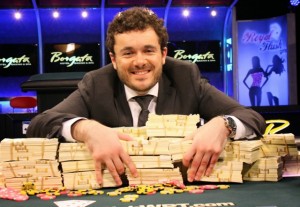 Simply put, you want your clothes to convey confidence and style. You want to be snug but you also want your clothes to convey that you’re someone who is taken seriously. This is true whether you play for $100 or $100,000.
Simply put, you want your clothes to convey confidence and style. You want to be snug but you also want your clothes to convey that you’re someone who is taken seriously. This is true whether you play for $100 or $100,000.
Underline
Social networking is becoming a necessity in the business world and poker is playing an increasing role. Hedge fund managers like David Einhorn and Dan Shak are frequent players and Bloomberg has produced several programs featuring Wall Street executives playing poker. Silicon Valley has many players including CEOs, software developers and startup entrepreneurs. Harvard and MIT both teach poker classes as part of their business curriculum.
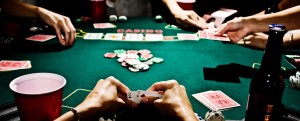 To win at poker you must at all times have the best hand. However, acting like a winner and dressing like a winner often means that you’ll get more from your good hands, and also reap more from the table, no matter why you are playing.
To win at poker you must at all times have the best hand. However, acting like a winner and dressing like a winner often means that you’ll get more from your good hands, and also reap more from the table, no matter why you are playing.
The most vital aspect to remember is that you cannot win, network, or have fun if you cannot get a seat at the table.
